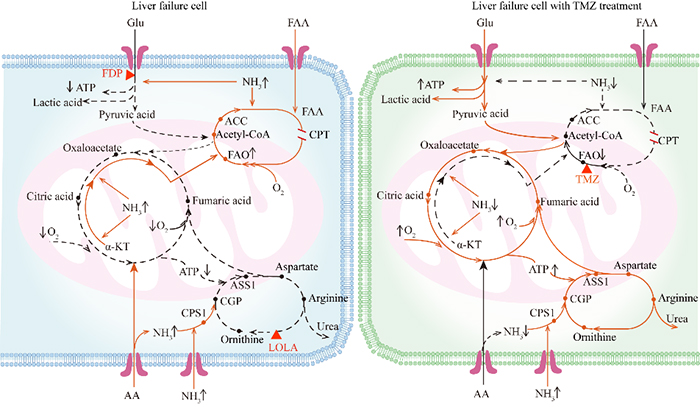Research group led by Prof. XU Guowang from the Dalian Institute of Chemical Physics (DICP) of the Chinese Academy of Sciences, in collaboration with research groups from The First Affiliated Hospital of Zhengzhou University and National Institutes of Health, proposed a new method for acute-on-chronic liver failure (ACLF) treatment. The schematic of the metabolic reprogramming of liver failure cell (left) and liver cell with TMZ treatment (right) (Image by ZHOU Yang)
ACLF is characterized by acute decompensation of liver function, organ failure(s), and high mortality. The main cause of ACLF in Asia is chronic HBV infection.
Liver transplantation remains the only effective therapy, but the rapid disease progression and the lack of donors cause high mortality rate. An effective therapeutic strategy for patients with ACLF is needed.
By analyzing metabolic profiles in liver tissue samples from HBV-related ACLF patients and the controls, the researchers identified metabolic characteristics of HBV-related ACLF patients: inhibited glycolysis, tricarboxylic acid cycle and urea cycle, and enhanced fatty acid oxidation (FAO) and glutamine anaplerosis.
They found that these effects were mainly attributed to hyperammonemia and hypoxia. Further in vitro study revealed that switching from FAO to glycolysis could improve hepatocyte survival in the hyperammonemic and hypoxic microenvironment.
Based on insights into the mechanism of metabolic reprogramming in patients with ACLF, they proposed a novel treatment strategy for patients with ACLF: inhibiting FAO.
Trimetazidine (TMZ) is a specific inhibitor of FAO that attenuates cardiomyocyte injury by switching the energy metabolism from FAO to glycolysis.
The study showed that TMZ increased glycolysis in the Chang liver cells exposed to hyperammonemia, which was accompanied by reduced ammonia levels. It also increased the oxygen consumption rate (OCR) at both the basal level and maximal capacity as well as the ATP generation, suggesting an enhanced oxidative phosphorylation.
Furthermore, TMZ decreased the apoptosis rate in liver tissue from rats exposed to NH4Cl.
A randomized clinical trial in The First Affiliated Hospital of Zhengzhou University confirms that inhibiting FAO using TMZ improves the prognosis of patients with HBV-related ACLF, especially severe ACLF patients.
This study provides a practical strategy for targeting metabolic reprogramming using TMZ to improve the survival of patients with HBV-related ACLF.
This work was published in
Advanced Science. It was supported by the National Natural Science Foundation of China and the National Key Research and Development Program of China.







